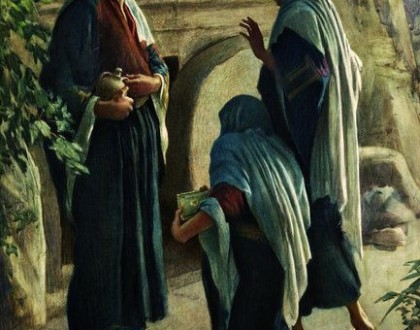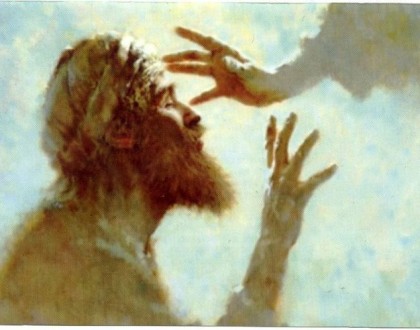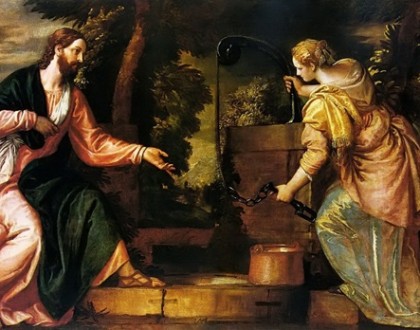DEC 6th 2nd Sunday of Advent

A poll was taken that found that the majority of British people do not believe that Jesus was a historical figure. This is an amazing claim in a Western world that prides itself in the objective claims of the reason as being our guiding light. Becoming Christian is seen as a blind leap of faith, the type of faith that believes in Leprechauns and Santa Claus.
There is an attempt today to reduce Jesus to a mere mythical figure. Another among many of nice but abstract stories with nonetheless a good and positive message.
As C. S. Lewis and J R R Tolkien (both experts in the mythological field) said, those who claim the gospel is a myth have never read neither myths nor the gospel!
No modern historians would put in doubt the authenticity for example something like Caesar’s Gallic War. Yet these events are founded on 9 or 10 documents or copies (one of the most for that era) and written in 900AD.
For the New Testament writings (written between 40Ad and 100AD) there are over 5,000 Greek manuscripts, over 10,000 Latin manuscripts and 9,300 other manuscripts, as well as over 36,000 citing’s in the writings of the early church fathers, all that within 300 years of the original event and writings !
To put it in a nutshell, it is by far the most documented event in human history.
The historicity of Jesus’ life is of central importance to Christianity.
There are many spiritual systems that trade primarily in poetry legend and myth. They use those literary devises to carry their message.
Joseph Campbell (one of he main inspirations behind the Star Wars books and movies) shows the enduring themes that come through in myths and legends etc.
But Christianity is not a mythic system. The founding texts of our great tradition simply do not allow for this interpretation.
One of the faces of theological liberalism is to turn Christianity into one more mythic system.
The first Christians were intensely interested in the historicity of what they were describing and preaching. Saint Luke is a good example of this. He was a Greek, most likely of the apostle Paul and he writes very good Greek so he probably came of age within a Greek cultural setting.
St Luke at the beginning of his gospel distinguishes himself as an historian.
He has read everything available very carefully and will now carefully plan and lay down his work (Luke 1).
The world of his time was steeped in myths and legends, but you see here Luke is not trading in myths and legends. He underlines that he is not writing that sort of book. What he is writing is what people of his time would have recognised as historical biography. Just the first few lines of this week’s gospel point to that;
“In the 15th year of Tiberius Caesar’s reign…
When Pontius Pilate was governor of Judaea…
Herod tetrarch of Galilee…
His brother Philip tetrarch of the lands of Ituraea and Trachonitis…
Lysanias tetrarch of Abilene…
During the pontificate of Annas and Caiaphas….”
Could the man get anymore exact? Could he be anymore completely insistent on situating his story in a particular time and place?
Could it be, in a word, anymore different than mythic discourse?
Nobody writes; ”Hercules did these things when ..so and so …was Emperor of Rome”. Nobody asks that question because mythic literature is not historical literature.
All the figures Luke mentions here can be independently verified as historical personages.
So is Jesus a mythic figure?
Is his story a legend?
Is it like stories of Hercules, Achilles etc.?
Clearly what is being communicated here, is that the answer is no.
Mythic abstractions are good as far as they go. They tell us certain truths and express them often very beautifully.
On the other hand they are also open to the charge that they represent wishful thinking, that they are but projections of our own consciousness.
They contain many psychological and spiritual truths but it can look and sound a lot like “wouldn’t it be great if things were that way”.
Here is the point, Luke is telling us that something happened. He is not just musing or inventing things on his own expressing some deep hope of his. Something happened. Something so unexpected and rare that it changed everything.
Somebody came here, Adventus, and made all the difference.
Luke is setting us up beautifully for the story he will tell.
He begins in the very way we would expect an ancient historian to begin, by invoking the high and mighty. Going back to Tiberius Caesar, Pontus Pilate, etc.
That s what writers were expected to write about in the ancient world.
This is exactly how Luke in the next chapter would commence his Christmas story.
What a surprising move he makes when in the gospel of today, the prologue of Luke we are told that the word of God did not come to any of those high and mighty players, the emperor or the governor, not even the high priest in the Jerusalem temple.
Rather, it comes to Jon, the son of Zachariah, in the desert. It comes to the most unlikely person in the most unlikely place.
The same is true of course of the Christmas story. The tale of is not finally about the emperor or Herod but about this poor unknown couple.
History matters so much to St Luke because God is intervening to reverse the usual course of history. Something happened, somebody came and in the most unexpected way reversed the course of history.
The Lord has come, he has really arrived in history, Adventus and therefore everything is different.
Recent Sermons

Easter Sunday – The Resurrection
April 14, 2017

4th Sunday of Lent Year A – The Man Born Blind
March 27, 2017

3rd Sunday of Lent Year A – The Samaritan Woman at the Well
March 20, 2017


